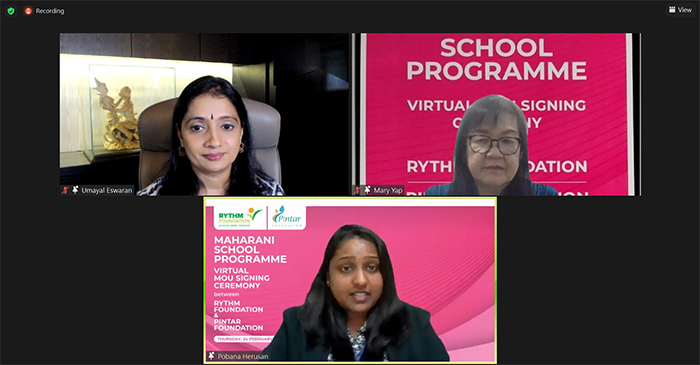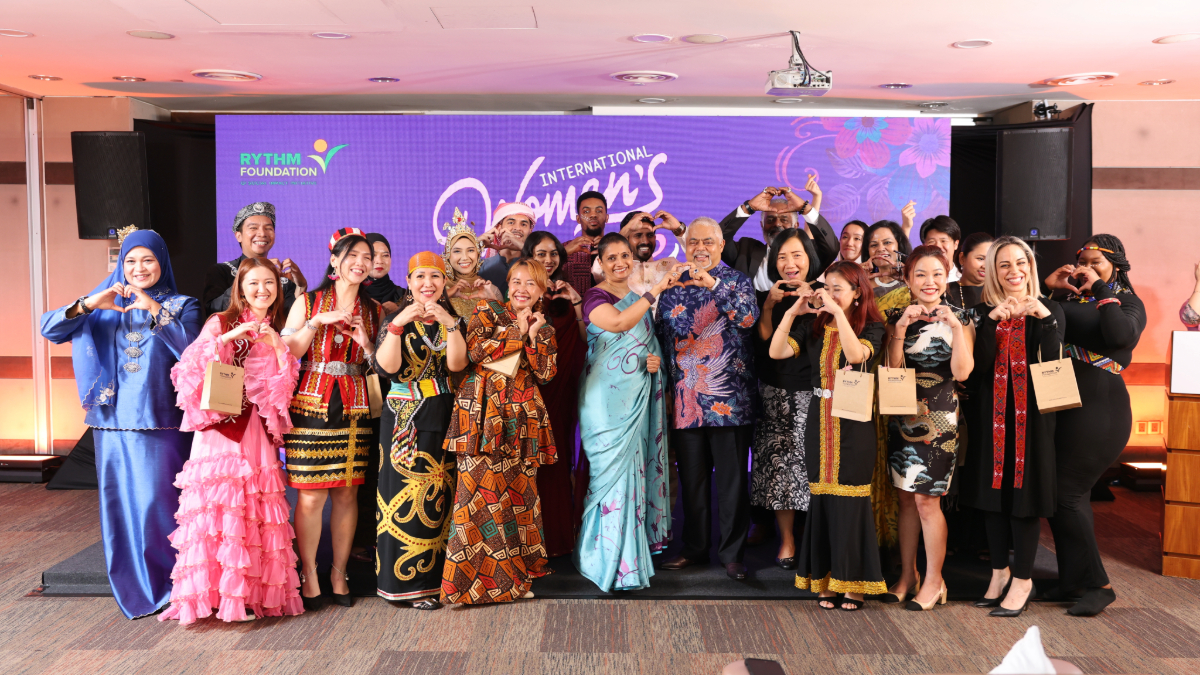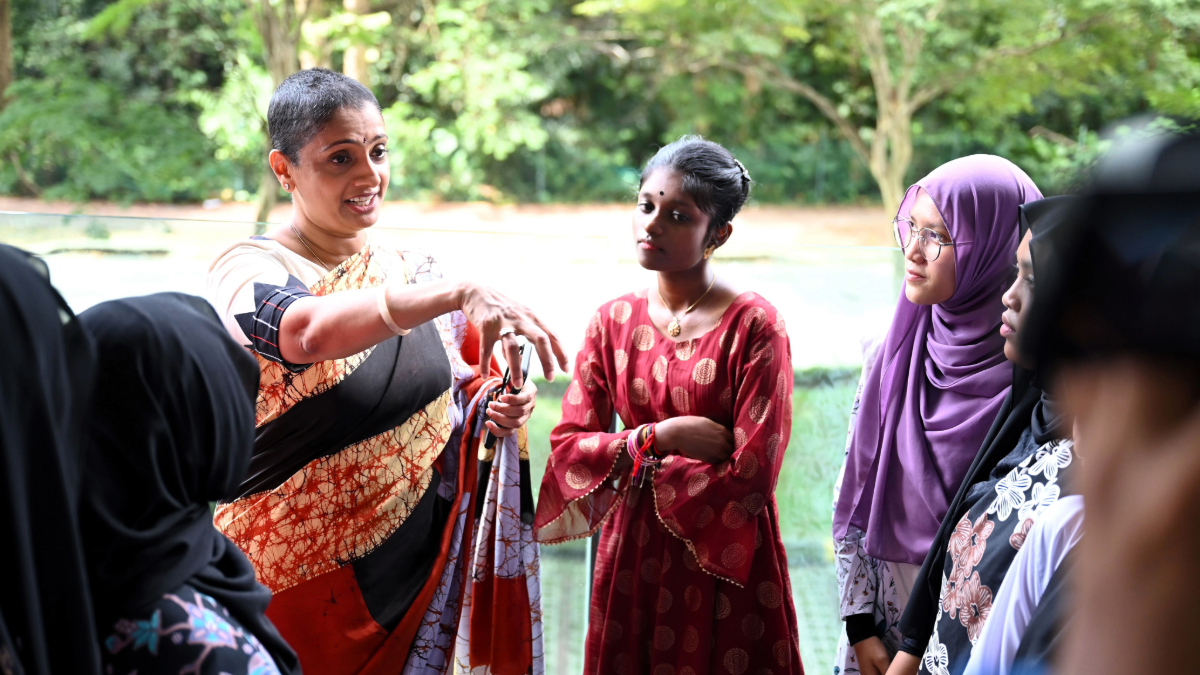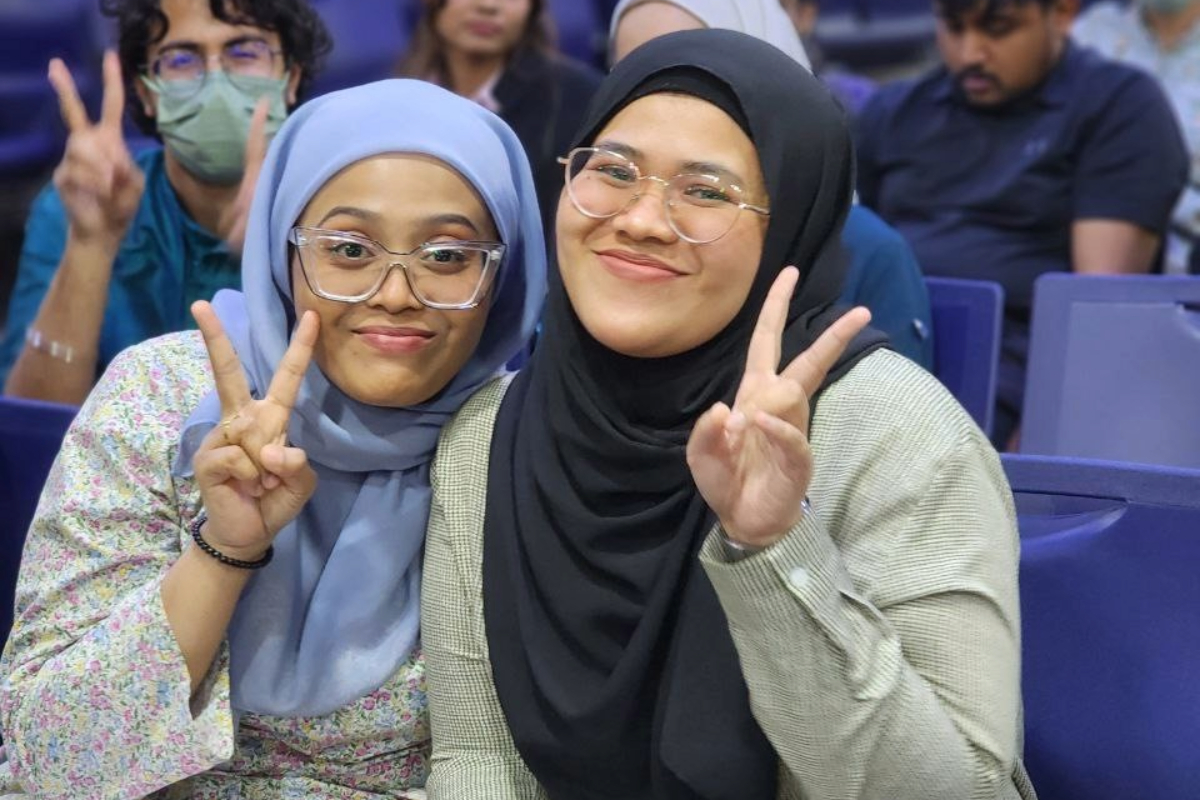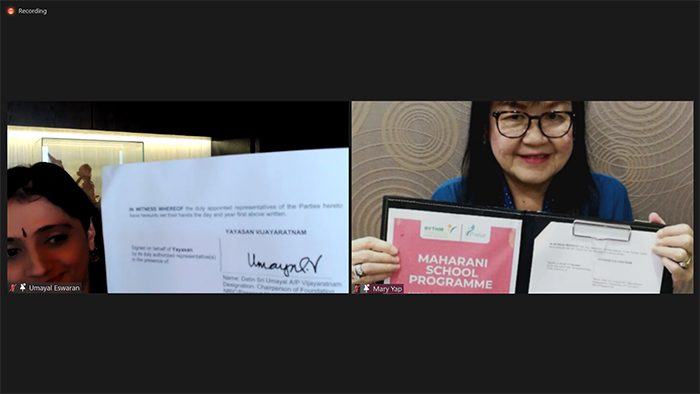 Datin Sri Umayal and Datuk Dr Mary show their signed documents.
The agreement also reinforces both organisations’ like-minded aspirations and values. For RYTHM, the social impact arm of the QI Group, the MSP represents two of the three main pillars of the Foundation – education for all and gender equality. Similarly, PINTAR’s mission is to make a meaningful difference in the lives of Malaysian students from underserved communities. One of its initiatives is the PINTAR School Adoption Programme, which encourages government-linked companies to support selected schools.
The goals of both foundations are in line with two of the United Nations’ Sustainable Development Goals (SDGs): SDG 4, which stresses providing quality education for all, and SDG 5, which emphasises gender equality.
In her speech, Datin Sri Umayal noted the significance of the ceremony just weeks before International Women’s Day.
She said, “It is unthinkable that in 2022, there is still not a single country across the world that has managed to achieve economic equality between genders. And these inequality gaps continue to increase as we move down the list from developed to developing and underdeveloped nations.”
Understanding what is at risk, Datin Sri Umayal said the Foundation sought to find out what it could do to stem the tide of gender inequality.
Datin Sri Umayal and Datuk Dr Mary show their signed documents.
The agreement also reinforces both organisations’ like-minded aspirations and values. For RYTHM, the social impact arm of the QI Group, the MSP represents two of the three main pillars of the Foundation – education for all and gender equality. Similarly, PINTAR’s mission is to make a meaningful difference in the lives of Malaysian students from underserved communities. One of its initiatives is the PINTAR School Adoption Programme, which encourages government-linked companies to support selected schools.
The goals of both foundations are in line with two of the United Nations’ Sustainable Development Goals (SDGs): SDG 4, which stresses providing quality education for all, and SDG 5, which emphasises gender equality.
In her speech, Datin Sri Umayal noted the significance of the ceremony just weeks before International Women’s Day.
She said, “It is unthinkable that in 2022, there is still not a single country across the world that has managed to achieve economic equality between genders. And these inequality gaps continue to increase as we move down the list from developed to developing and underdeveloped nations.”
Understanding what is at risk, Datin Sri Umayal said the Foundation sought to find out what it could do to stem the tide of gender inequality.
“At RYTHM, we acknowledge the enormity of the issues but choose not to dwell on them or be intimidated by them. Instead, we focus on finding practical and lasting solutions for these problems. “This is what the Maharani programme does. We look at girls and young women from marginalised communities and enhance their education experience by giving them the tools to develop into confident, responsible women.”With RYTHM’s expertise with the programme and PINTAR’s active engagement with the Education Ministry, the partnership marks the debut of the Maharani philosophy within national schools’ curricula. This collaboration seeks to enhance the education of young girls from marginalised communities and mould them into confident, responsible and civic-minded women. The agreement also involves RYTHM coaching 20 trainers from PINTAR to implement the programme in the participating schools.
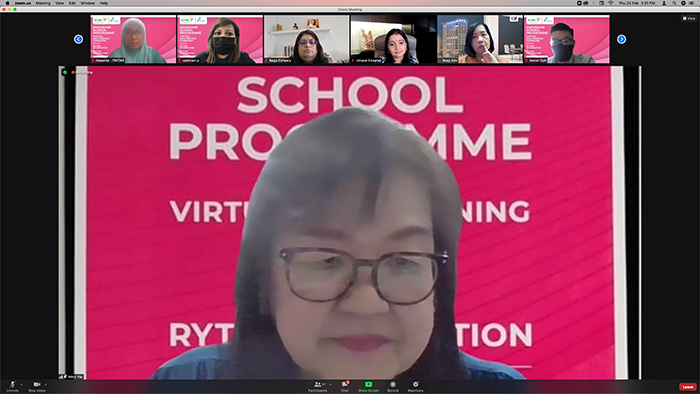 Datuk Dr Mary says the MSP empowers students to become holistic women.
In wishing the programme a meaningful success, Datuk Dr Mary highlighted in her speech that women’s empowerment was essential in achieving gender equality.
Datuk Dr Mary says the MSP empowers students to become holistic women.
In wishing the programme a meaningful success, Datuk Dr Mary highlighted in her speech that women’s empowerment was essential in achieving gender equality.
“The Maharani programme focuses on this area of need and inspires and empowers poor, marginalised, socially-excluded girls and young women. The programme directly tackles women’s issues by providing the life skills and knowledge to empower them to become holistic women,” she said.For PINTAR, she added, the aim had always been to provide Malaysian school children with the opportunities and access to holistic education and to affect meaningful changes that benefit them.
“My message to all the girls and women in Malaysia: You are capable, valuable and powerful, and you deserve every opportunity in the world to pursue and achieve your dreams.”
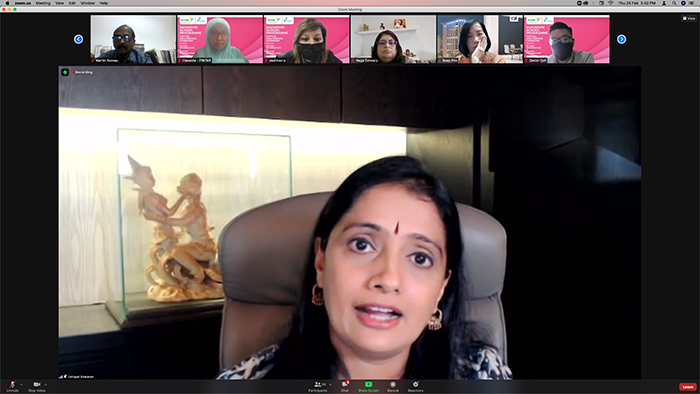 Datin Sri Umayal says the MSP strives to stem gender equality in Malaysia.
RYTHM is eager to expand the MSP’s reach to more deserving girls through the PINTAR partnership. “As schools reopen after two years of intermittent lockdowns, this is crucial to support teenage girls. They may have lost some interpersonal skills and fell behind on their studies due to remote learning arrangements,” Datin Sri Umayal added.
The MSP primarily promotes gender equality, sexual and reproductive health, ethnicity and culture, and physical and spiritual wellness. The programme’s vision is to create “a world where girls and young women can achieve their full potential and contribute to their community’s wellbeing.”
The Head of RYTHM, Santhi Periasamy, noted in her opening remarks that it was only natural for RYTHM to collaborate with PINTAR on expanding the project.
She said, “Over the years, our drive to take the programme to national schools has remained strong and steady. PINTAR was already a ground partner helping us reach out to schools, and we knew it would be best to work with a partner who shared common aspirations and goals. They were only too pleased to come on board, and here we are today.
Datin Sri Umayal says the MSP strives to stem gender equality in Malaysia.
RYTHM is eager to expand the MSP’s reach to more deserving girls through the PINTAR partnership. “As schools reopen after two years of intermittent lockdowns, this is crucial to support teenage girls. They may have lost some interpersonal skills and fell behind on their studies due to remote learning arrangements,” Datin Sri Umayal added.
The MSP primarily promotes gender equality, sexual and reproductive health, ethnicity and culture, and physical and spiritual wellness. The programme’s vision is to create “a world where girls and young women can achieve their full potential and contribute to their community’s wellbeing.”
The Head of RYTHM, Santhi Periasamy, noted in her opening remarks that it was only natural for RYTHM to collaborate with PINTAR on expanding the project.
She said, “Over the years, our drive to take the programme to national schools has remained strong and steady. PINTAR was already a ground partner helping us reach out to schools, and we knew it would be best to work with a partner who shared common aspirations and goals. They were only too pleased to come on board, and here we are today.
“This much-awaited event marks the start of a momentous four-year journey. We hope to positively impact disadvantaged girls to acquire the knowledge, skills and competencies to help them respond to the economic, technological, and societal shifts.”Santhi also thanked PINTAR, the Selangor Education Department and the participating schools for their faith in working with RYTHM in implementing the MSP. Since 2010, the programme has touched the lives of more than 7,500 girls and young women from various schools across Malaysia. In 2018, RYTHM also launched the Maharani Trainer Kit (MTK), a module for qualified trainers to use as a point of reference to run the programme independently. The programme comprises three phases: self-discovery, being one with nature and building leadership capacity. The first phase encourages participants to explore their identity and develop their confidence and self-esteem. The second phase educates them on appreciating nature, acquiring basic survival skills, and becoming stronger physically. The final stage teaches them to recognise their leadership potential and use practical communication skills to create change. While RYTHM focuses on implementing the various modules on self and character development, PINTAR will provide support to ensure the students’ academic progress.
The RYTHM-PINTAR Maharani School Programme (MSP) Operational from mid-2021 until 2024, the 42-month programme targets moulding 40 Form 2 (Grade 8) students from households in the bottom 40% of income earners (B40 group) over the next four years to Form 5 (Grade 11). The trainers will focus on distinct topics with each student depending on their identified priority for the year. The decision to start with Form 2 students is to allow them to adjust and settle into a new environment during their first year in secondary school before being introduced to Maharani. Year 1 (Form 2) In 2022, trainers will conduct 13 courses related to self-consciousness, human rights, gender equality, interpersonal relationships, and power relations to instil confidence in the girls. In addition, the programme will include Bahasa Malaysia, English, Mathematics and Science classes for those facing difficulties catching up due to remote learning caused by the pandemic. Year 2 (Form 3) The trainers will conduct individual three-day-two-night camps in the five schools in the second year. The camp aims to expose students to challenging environments to build on their courage, resilience, and teamwork among peers. In addition, through motivation sessions and tuition classes in the core subjects, this phase will also support students in their Sistem Pentaksiran Tingkatan Tiga (PT3) examination. Year 3 (Form 4) The programme’s third year will see students receiving counselling and career guidance through eight sessions on skills and career-related topics. Year 4 (Form 5) The trainers will provide three stress management-related sessions for the programme’s final year. They will also receive additional academic support because it is a critical year for those sitting for the Sijil Pelajaran Malaysia (SPM) examination. They will receive tutoring in various arts, accounting, science, and core subjects. A camp is planned to mark the programme’s end and will focus on preparing the students for young adulthood post-SPM.

